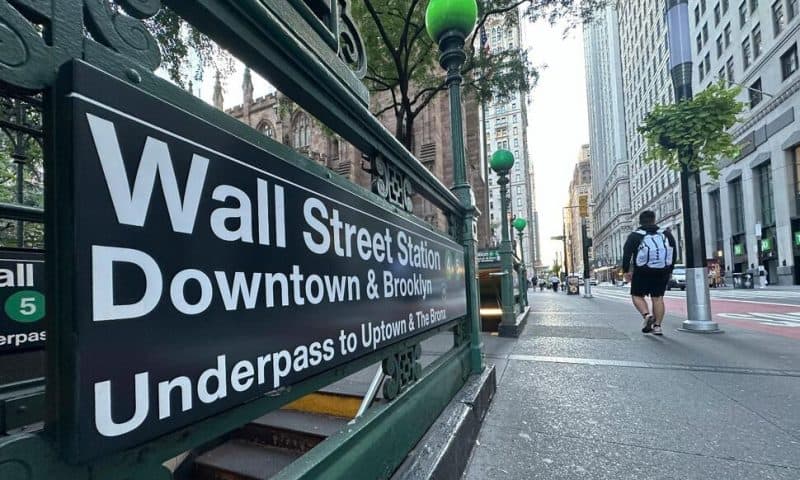Wall Street rolled to more records as U.S. stocks added to their all-time highs
NEW YORK — Wall Street rolled to more records Monday as U.S. stocks added to their all-time highs.
The S&P 500 climbed 0.8% to build on its record set on Friday. It’s coming off its fifth straight winning week and is on track for its longest weekly winning streak of the year.
The Dow Jones Industrial Average rose 0.5% and added 201 points to its own record, while the Nasdaq composite gained 0.9%.
The gains followed relatively quiet trading in Europe, while the U.S. bond market remained closed for the day because of a holiday.
The strongest action in global markets came from China, where the finance minister gave a highly anticipated update on Saturday about plans for the world’s second-largest economy. Lan Fo’an said the government is looking at additional ways to boost the economy, but he stopped short of unveiling a major new stimulus plan that investors were hoping for.
The lack of detail sent markets spinning. Stocks in Shanghai jumped 2.1%, but the Hang Seng index in Hong Kong fell 0.7%. Crude oil prices, meanwhile, sank roughly 2% on worries about demand from China’s slowing economy.
Hopes for big stimulus in China have sent Chinese stocks sharply higher recently after they languished for years. But investors are skeptical about how much it can remake and restore the economy.
“While clearly welcome, the efforts may be insufficient to spur a new reflationary cycle,” according to Lisa Shalett, chief investment officer at Morgan Stanley Wealth Management.
Besides oil, prices also fell for copper and other commodities that a healthy Chinese economy would devour. That helped drive down prices for miners, such as Freeport-McMoRan, which fell 2.3% for one of the larger losses in the S&P 500.
Boeing lost 1.3% in its first trading since the aerospace giant warned that it expects to report that it burned through $1.3 billion in cash during the latest quarter and lost $9.97 per share. Boeing also said it was laying off 10% of its workforce as it tries to deal with a labor strike that is crippling production of the company’s best-selling airline planes.
On the winning side of Wall Street was SoFi Technologies. It rose 11.4% after announcing a $2 billion loan platform agreement with investment firm Fortress Investment Group, where SoFi will refer pre-qualified borrowers.
Longboard Pharmaceuticals soared 51.6% after H. Lundbeck, a Danish company, said it would buy the biopharmaceutical company in an all-cash deal valuing it at $2.6 billion.
Trump Media & Technology Group jumped 18.5% and is near $30 again for the first time since July. The company behind former President Donald Trump’s Truth Social platform had briefly dropped below $12 last month. It continues to lose money, but its stock often moves more with Trump’s perceived re-election chances than anything else.
All told, the S&P 500 rose 44.82 points to 5,859.85. The Dow added 201.36 to 43,065.22, and the Nasdaq composite gained 159.75 to 18,502.69.
This upcoming week will have few top-tier economic reports outside of Thursday’s update on sales at U.S. retailers to help guide trading. That will likely leave the emphasis on corporate earnings reports, which will pick up the pace this week after big banks began the reporting season last week.
Bank of America, Johnson & Johnson and UnitedHealth Group will all report their latest results on Tuesday. Later in the week will come United Airlines, Netflix, American Express and Procter & Gamble.
Analysts are looking for S&P 500 companies to deliver overall growth of 4.1% in earnings per share for the latest quarter from a year earlier, according to FactSet. If they’re correct, it would be a fifth straight quarter of growth.
Solid, continued growth in profits for companies would help tamp down criticism that’s built up about how expensive the broad stock market looks, after share prices ran higher faster than earnings.
Stocks have broadly rallied to records on relief that interest rates are finally heading back down, now that the Federal Reserve has widened its focus to include keeping the economy humming instead of just fighting high inflation.
Recent reports showing the U.S. economy remains stronger than expected have also raised optimism that the Fed can pull off a perfect landing where it gets inflation down to 2% without causing a recession that many had thought would be necessary.

